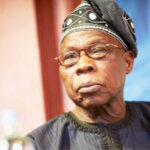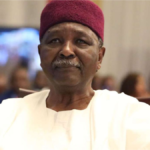Former President Olusegun Obasanjo has faulted verdicts of the Nigerians judges on the electoral disputes, saying three to five judges should not overturn decisions made by millions of voters during an election.
Obasanjo described the powers vested in the hands of a few judges as “totally unacceptable.”
The former president spoke in the wake of the ongoing judgements of the Court of Appeal on the electoral disputes arising from the 2023 elections in Nigeria.
Only last week, three governors were sacked in separate judgements delivered by the judges of the Court of Appeal.
Subsidy removal: Federation Account monthly inflow exceeds N1trn – FG
FG: We need $35bn to begin concrete roads
The affected governors are, Dauda Lawal of Zamfara State, Abba Kabir Yusuf of Kano and Caleb Mutfwang of Plateau.
The decisions have triggered reactions, earning the judiciary more knocks than kudos.
Speaking at the high-level consultation on Rethinking Western Liberal Democracy in Africa held at Green Resort Legacy, Olusegun Obasanjo Presidential Library, Abeokuta, Ogun State, the former president faulted what he labelled “cathedral pronouncements” by the judges.
“I believe whatever form of democracy we have or whatever system of government we have, three or four men in the judiciary should not be able to overturn the decisions of millions that have voted.
“Now, we have to find a way to handle that. I don’t know what the way will be but, for me, I think it’s totally unacceptable that millions (of votes), maybe 10 million on one side, maybe 9 million on the other side. Then, you have five people sitting down, three of them agree, two disagree. And you come up and make cathedral pronouncements that cannot be changed, I believe that should not be accepted.
“How do we do it? I don’t know. But whatever form of democracy we have, we should look at how to handle this. If you say ‘go again for election,’ then, what happened to the previous election? I don’t know.
“So, I personally feel strongly about it. It does not matter what you say about the judiciary, but in fact only five people or seven will sit down. If they are five, three may agree, two may not agree, and the decision of three will be final. All that you have done comes to the decision of three or decision of four,” Obasanjo said.
Renowned human rights activist, Femi Falana (SAN), had also joined the call to reduce the influence of the judiciary on elections, citing the Kano gubernatorial dispute and the decision of the tribunal as wrong.
He said it was dangerous judicial trend the recent tendency by the courts to sanction voters and deprive them of their rights to elect leaders of their choice due to the mistakes of some electoral officers.

 Join Daily Trust WhatsApp Community For Quick Access To News and Happenings Around You.
Join Daily Trust WhatsApp Community For Quick Access To News and Happenings Around You.

